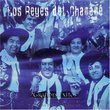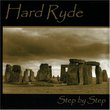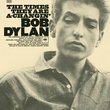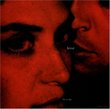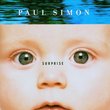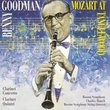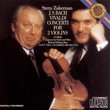| All Artists: Johann Sebastian Bach, Herbert von Karajan, Berlin Philharmonic Orchestra, Edith Picht-Axenfeld Title: Bach: Brandenburg Concertos Members Wishing: 0 Total Copies: 0 Label: Dg Imports Release Date: 8/15/1996 Album Type: Import Genre: Classical Styles: Forms & Genres, Concertos, Suites, Historical Periods, Baroque (c.1600-1750), Modern, 20th, & 21st Century Number of Discs: 2 SwapaCD Credits: 2 UPC: 028945300122 |
Search - Johann Sebastian Bach, Herbert von Karajan, Berlin Philharmonic Orchestra :: Bach: Brandenburg Concertos
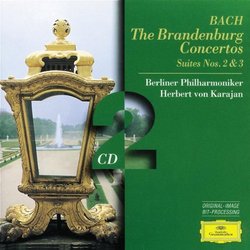 | Johann Sebastian Bach, Herbert von Karajan, Berlin Philharmonic Orchestra Bach: Brandenburg Concertos Genre: Classical
|
Larger Image |
CD DetailsSimilar CDs
Similarly Requested CDs
|
CD ReviewsA powerful testament against the period instrument fashion Derek Lee | St. Paul, MN USA | 12/04/2002 (5 out of 5 stars) "I simply have never been able to understand why in the past three decades or so anything other than a "period" recording of any classical music, especially that of Bach, is looked upon as taboo. To be perfectly frank, I have never heard a "period" recording that I have been completely satisfied with, although perhaps some exist. I understand what they are aiming for, that is, a performance that sounds as close to what it would have sounded like originally as possible, but I don't understand why they are aiming for it; after all, is it completely obvious that all composers compose for the instruments of the time? I don't think so. For example, Beethoven's last piano sonatas certainly were not composed for the timid little piano of the early 19th century; Beethoven even said that those sonatas were beyond the capabilities of the piano (of that time). Although one might think that Beethoven was the exception, rather than the rule, I myself disagree. Rather, I see Beethoven not as a radical revolutionary in classical music, but rather the continuation and summit of the principles underlying the music of Mozart and Bach. What I am really trying to say here is that performance of great music should NOT be judged on whether or not it happens to be performed on instruments similar to those of the period, but entirely on whether or not the sound, the feeling of the performed music corresponds to what the composer was trying to convey. Incidentally, allow me to point out how contradictory the period enthusiasts are; these people look on performances of Bach with modern orchestras with disdain; however these very same people worship the crisp, clean style of Gould, even though he performed on the piano, not the instrument the music was written for, the harpsichord. I myself find the sound of period performances of the Brandenburgs much too sharp and shallow for my tastes, and for what I believe Bach would have wanted. However, this set of recordings have exactly the opposite characteristics; throughout, the sound is beautiful, rich and resonant, and the Berlin Philharmonic brings out the emotional power of this music like no period orchestra can. I especially love the slow movements of these concertos, both the compositions and performances are tender, powerful, and moving. I honestly believe that these performances carry across what Bach wanted to convey. Incidentally, I must respectfully disagree with an earlier reviewer; I can hear the harpsichord in fifth concerto perfectly well, and I think the balance of the harpsichord against the violin, flute, and orchestra is completely appropriate. To be sure, the harpsichord does not have as much sheer volume as the other participants, but that is in the nature of the instrument, and cannot be overcome in real performance." Surprisingly satisfying! 09/01/1999 (5 out of 5 stars) "Karajan and Bach? That seems like an unlikely combination, considering that the great conductor spent most of his energies in the Romantic world of Wagner, Brahms, and Tchaikovsky, not the Baroque world of Bach, Handel, and Vivaldi. There are so many period instrument interpretations of the Brandenburg Concertos these days, one can almost laugh at the thought of the Berlin Philharmonic taking on these works. But the results are wonderful! While the recordings with period instruments often emphasize the remoteness of Bach's music, these modern versions show that Bach was truly the father of Classical music. One is immediately swept away by the beauty of the strings, and the cheerful, well-integrated detail of the winds. These are works that belong next to Mozart, Beethoven, and Brahms. They may not be first choice (Karl Richter's legendary versions hold that title), but Karajan's Brandenburgs are an insightful and beautiful way to experience Bach, and I highly recommend them." Overall not a bad effort, but ponderous Thomas B Dawkins | 07/17/2000 (4 out of 5 stars) "On the whole, this set is quite satisfying musically, although the general feel is rather heavy, owing mostly to a large modern orchestral set rather than to the conducting. The use of modern flutes instead of recorders in the second and fourth concerti changes the tone a great deal, not particularly for the better, as recorders sound much more "clean" in general. The tempi are fairly sound, and I especially like the true Largo opening to the second Orchestral suite's overture, which is appropriately "overdotted" in the French Style. The flute work in that piece is exemplary. The sixth concerto probably suffers the most from being played on modern instruments, sacrificing the more nasal tone of the two violas da gamba in favor of two more sets of 'celli, although it is remarkably clear for the most part. The harpsichord in the fifth is the most disappointing, and is practically smothered in many areas, probably due to the fact that the piece was originally intended to be played with the three soloists and only one violin, viola, violoncello and bass instead of a full symphony orchestra. The harpsichord continuo is generally on the weak side, but this is probably mere overbalancing on the part of the strings. I prefer the English Concert/Trevor Pinnock/Archiv version for a more "historically accurate" version (it is also played at low pitch, that is A = modern A-flat). In addition to using the proper instrumentation, the ensemble is more cohesive as a whole as a result of having fewer players and only a harpsichordist as the conductor."
|

 Track Listings (17) - Disc #1
Track Listings (17) - Disc #1